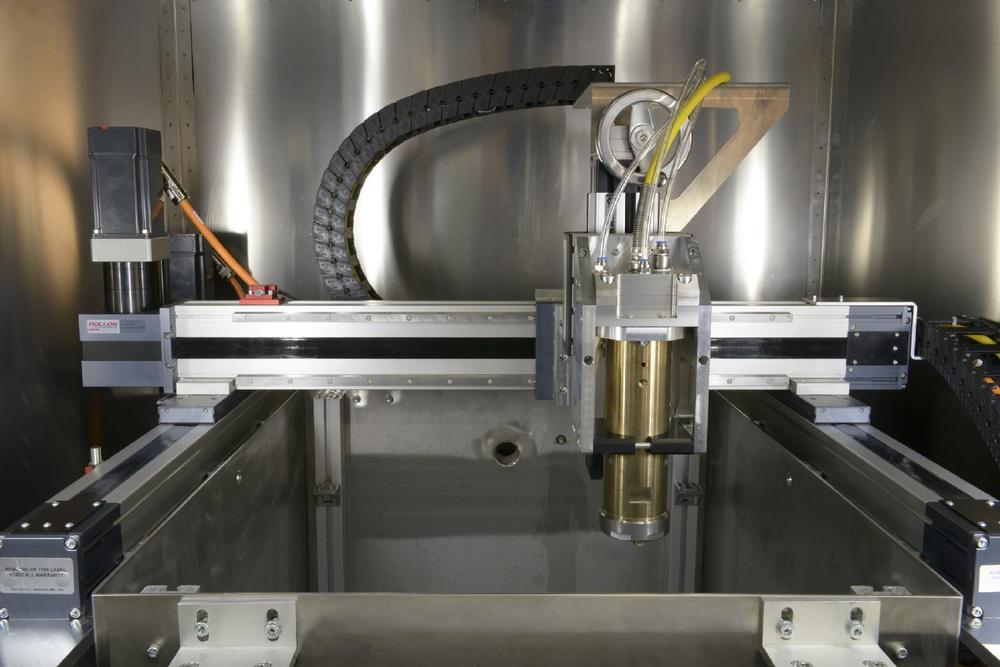In the newly developed process, the researchers equipped the mechanical drill with a high-performance laser whose energy is guided onto the rock via a water-jet. This makes it possible to weaken the material immediately before the drilling process takes place and facilitates subsequent mechanical removal by the drilling tool. The water-jet not only guides the laser beam to the rock face, but also prevents contamination and damage of the sensitive laser optics.
In order to increase the rate of penetration of the drill bit and to preserve its cutting edge, it is necessary to introduce additional energy into the borehole. Since different and often unpredictable materials have to be processed as the drilling depth increases, the flexible adjustment of the laser output power makes it a particularly efficient tool.
Successful tests of the hybrid tool
In the machine shop at the Fraunhofer IPT, the researchers in Aachen have set up a test rig with a laser capable of an optical output of up to 30 kilowatts. In laboratory tests, the project partners tested the process and made preparations for its transfer to the actual application: The laser weakened sandstone, granite and quartzite, all of which are hard rocks with a strength of more than 150 megapascals, by up to 80 percent.
In the next step, the engineers used the laser on the drilling rig in a specially developed drill string and, in collaboration with the International Geothermal Centre Bochum, successfully tested the new tool under realistic conditions in field trials.
In future research projects, the partners intend to further enhance the distribution of the laser power and add digital sensors to the hybrid tool in order to obtain feedback from the drilling process and thus to be able to react to changes along the drilling path.
Cost-effective geothermal drilling for the production of regenerative energy
The powerful drilling system will help to reduce the cost of deep geothermal drilling in the future and enable geothermal energy to be exploited as an inexhaustible energy source. This form of energy can take over part of the base load in the energy mix and can support other renewable sources such as sun, wind and water in a comparatively environmentally friendly compared to fossil fuels.
Project Consortium
- Fraunhofer Institute for Production Technology IPT, Aachen
- GZB International Geothermal Centre Bochum e.V.
- Herrenknecht Vertical GmbH, Schwanau, Germany
- IPG Laser GmbH, Burbach, Germany
- KAMAT Pumpen GmbH & Co KG, Witten, Germany
- Synova S.A. (associated partner), Duillier, Switzerland
The LaserJetDrilling research project was funded by the Federal Ministry for Economics Affairs and Energy (BMWi) and supervised by the PTJ (funding number: 0325784A).
Das Fraunhofer-Institut für Produktionstechnologie IPT vereint langjähriges Wissen und Erfahrung aus allen Gebieten der Produktionstechnik. In den Bereichen Prozesstechnologie, Produktionsmaschinen, Produktionsqualität und Messtechnik sowie Technologiemanagement bietet das Fraunhofer IPT seinen Kunden und Projektpartnern angewandte Forschung und Entwicklung für die vernetzte, adaptive Produktion. Das Leistungsspektrum des Instituts orientiert sich an den individuellen Aufgaben und Herausforderungen innerhalb bestimmter Branchen, Technologien und Produktbereiche, darunter Automobilbau und -zulieferer, Energie, Life Sciences, Luftfahrt, Maschinen- und Anlagenbau, Optik, Präzisions- und Mikrotechnik sowie Werkzeug- und Formenbau.
Fraunhofer-Institut für Produktionstechnologie IPT
Steinbachstraße 17
52074 Aachen
Telefon: + 49 241 8904-0
Telefax: + 49 2 41 8904-198
http://www.ipt.fraunhofer.de
Gruppenleiter
Telefon: +49 (241) 8904-518
E-Mail: florian.schmidt@ipt.fraunhofer.de
Externe und interne Kommunikation
Telefon: +49 (241) 8904-326
E-Mail: presse@ipt.fraunhofer.de
